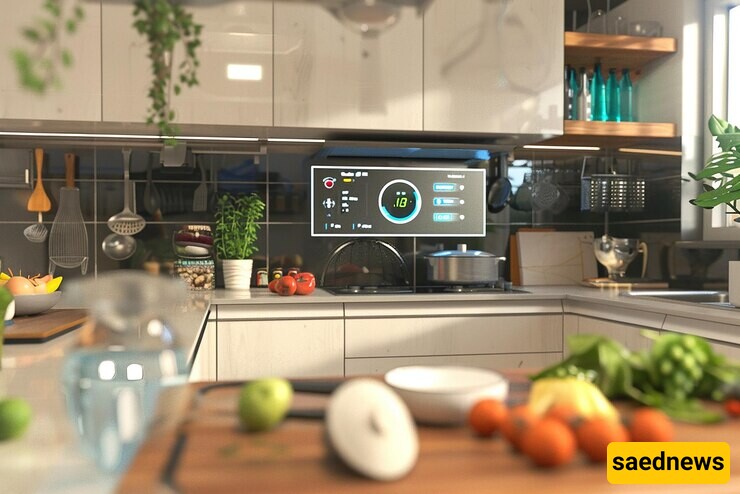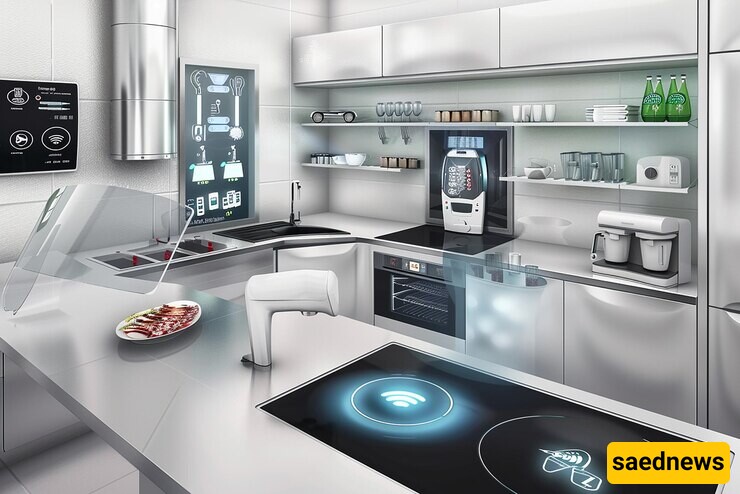SAEDNEWS: Smart kitchens are revolutionizing homes with advanced technology, offering convenience, efficiency, and sustainability. AI-driven appliances, IoT integration, and data analytics are shaping the future of cooking and food management.

According to SAEDNEWS, the concept of a smart kitchen has evolved beyond basic automation. Today, it integrates artificial intelligence (AI), the Internet of Things (IoT), and data analytics to create intelligent culinary spaces that optimize efficiency, reduce waste, and enhance convenience. From refrigerators that track groceries to ovens that cook with precision, smart kitchens are no longer a luxury—they are rapidly becoming a necessity in modern homes.

Technological advancements aim to address common kitchen challenges such as food spoilage, energy consumption, and time management. As consumers increasingly seek connected solutions, smart kitchens are set to become central hubs in households worldwide.
AI has become the brain behind many smart kitchen devices. Appliances like AI-powered ovens and refrigerators can now make decisions based on data patterns. For instance, smart ovens can recognize the type of food placed inside and automatically adjust cooking temperature and time. Similarly, refrigerators equipped with AI track expiry dates, suggest recipes based on available ingredients, and even notify users when supplies are running low.
Dishwashers have also evolved, using sensors to detect how dirty dishes are and adjusting water and energy usage accordingly. These advancements not only save time but also contribute to sustainability by minimizing energy and water wastage.

The rise of virtual assistants such as Amazon Alexa and Google Assistant has brought voice control to kitchens. From preheating ovens and setting timers to ordering groceries online, these voice-activated systems simplify daily tasks. Mobile app integration further enhances control, allowing users to manage appliances remotely. For example, homeowners can monitor cooking progress on their smartphones or receive alerts if a refrigerator door is left open. These connected systems ensure that users remain in control even when they’re away from home.
Smart kitchens are designed with sustainability at their core. Appliances now come with energy-monitoring systems that track consumption and suggest ways to optimize usage. Smart refrigerators reduce food spoilage by monitoring temperatures and humidity, while ovens avoid unnecessary energy use with automated shut-off features.
Furthermore, connected systems can provide data analytics to help users make informed decisions about energy consumption. By minimizing waste and maximizing efficiency, these technologies contribute to both cost savings and environmental protection.
Smart kitchen gadgets have elevated cooking precision and personalization. Devices such as smart coffee machines, connected air fryers, and intelligent food processors offer customized experiences based on user preferences.
For example, app-controlled coffee makers can prepare drinks according to specific tastes, while precision cookers use sous-vide technology to ensure perfectly cooked meals. Smart kitchen scales and thermometers further eliminate guesswork, allowing users to measure and monitor ingredients and temperatures with accuracy. These tools not only improve the quality of meals but also make the cooking process more enjoyable and stress-free.
Behind every smart appliance lies a wealth of data. Kitchens are now capable of analyzing user behavior, cooking patterns, and maintenance needs. This data helps improve appliance performance, predict potential breakdowns, and ensure optimal energy use. For instance, smart ovens can remember frequently cooked meals and suggest adjustments for better results. Similarly, refrigerators can analyze grocery trends to reduce over-purchasing and food wastage. In commercial settings, data analytics is even more impactful, enabling restaurants and catering services to optimize inventory management and minimize resource waste.
Safety remains a top priority in smart kitchen designs. IoT-enabled devices can detect gas leaks, monitor smoke levels, and alert users about potential hazards. Smart stovetops now come with built-in sensors that automatically turn off burners if no activity is detected. Child safety features have also been integrated into many devices, preventing unintended usage. Additionally, remote monitoring through mobile apps allows homeowners to ensure their kitchens are secure, even when they are away.
As technology continues to advance, the future of smart kitchens looks promising. Integration of robotics into cooking tasks, AI-driven recipe recommendations tailored to health goals, and even self-cleaning appliances are on the horizon. Voice commands will become more sophisticated, and devices will interact seamlessly across platforms. Personalized nutrition plans, designed based on real-time health data, may soon become a standard feature in smart kitchens. The focus will also shift towards eco-friendly designs, with appliances built from sustainable materials and operating on minimal energy footprints.
While smart kitchens offer numerous benefits, they come with challenges. High installation costs and concerns about data privacy are among the key barriers to widespread adoption. Additionally, reliance on internet connectivity can be a drawback in regions with unstable networks.
Manufacturers will need to address these concerns by ensuring robust cybersecurity measures and offering affordable solutions. Increased awareness and user education will also play a role in overcoming adoption challenges.
Smart kitchen innovations are not just about flashy gadgets—they represent a shift towards smarter, more efficient living. With AI, IoT, and data analytics leading the way, kitchens are transforming into intelligent spaces that save time, reduce waste, and simplify everyday tasks.
As technology evolves, smart kitchens will become more accessible, sustainable, and indispensable in homes around the world. For homeowners and businesses alike, investing in smart kitchen technology is no longer a luxury but a step towards a smarter future.

